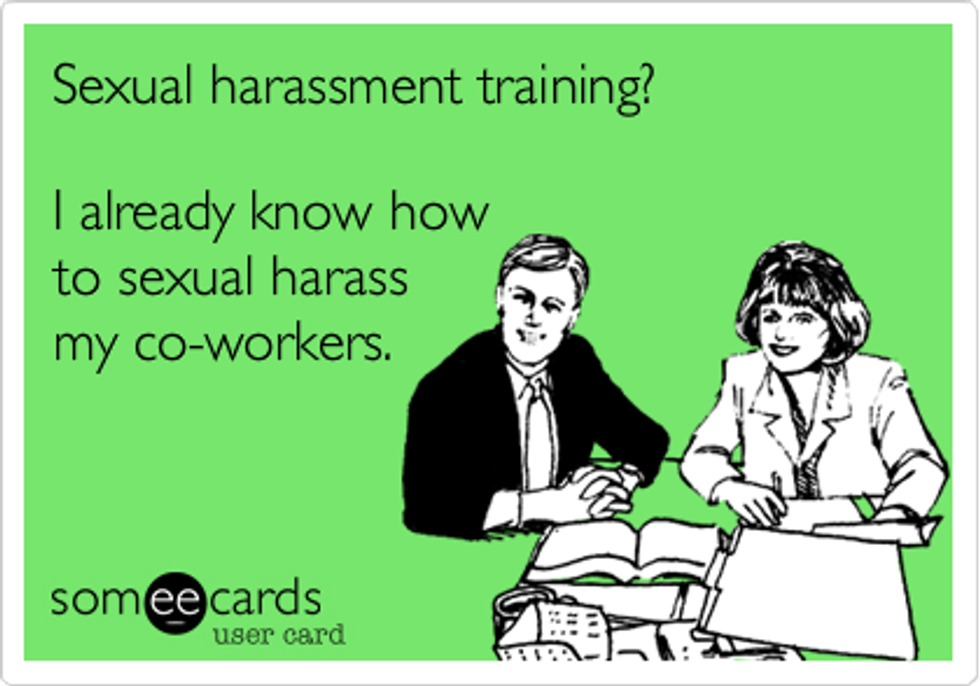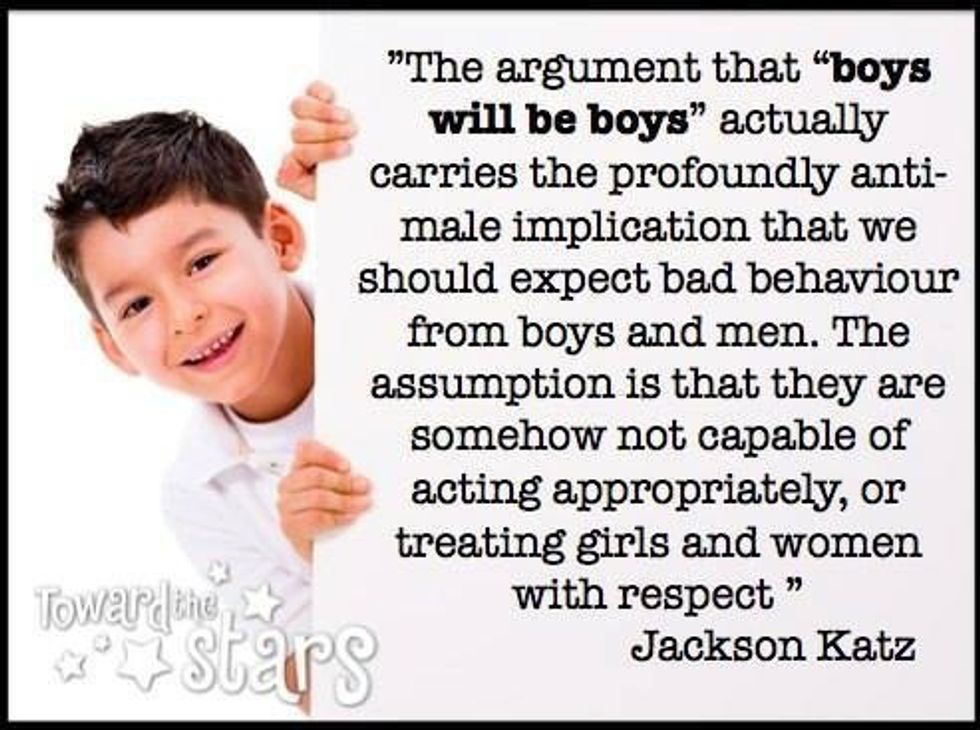“Chloe wants to blow me.”
That’s what was said to me one of the first times I was ever sexually harassed. I was 12. I didn’t even know what “blow me” meant yet. But the sentence rhymed, so it was funny - or so we thought.
Me, I laughed because I didn’t get it. I laughed because that’s what the other boys in my class were doing. And I laughed because, if I didn’t, either my peers would know I didn’t understand this new lingo, or the whole pack of other laughers would be against me. And all of those other laughers were my boy classmates.
And anyway, boys will be boys, right?
This is a line so tragically overused in our society to justify the uncomfortable (at best) and horrific (at worst) statements and actions committed by young boys against young girls. I say “young boys” because this is where it starts—for many, like me, it may be as early as elementary school.
These actions do not stop in adulthood, committed by men against women, but we may be able to argue that their reproduction is a direct result of the training learned during the years of primary and secondary school. Verbal sexism, sexual comments and sometimes physical actions made by boys are often lightly brushed away because, as we know, boys will be boys.
By the time I was old enough to figure out what any of these sexual slurs meant, I had seriously mastered the art of laughing. And I had mastered this "art" through rampant, unconscious training.
Ten years later, as a young woman, I was confronted by a group of five men on a mission. They began to grab me, pull on my arms and speak in a different language, interspersing the English words “like” and “sex” with inquiring tones. But do you know what I did?
I smiled!
I even laughed at first. I was kind. Utterly terrified that I might end up raped or beaten or who knows what, I politely said, “no, thanks” and “please stop.” I gently pushed their grabbing hands away. But what is most disconcerting, I smiled while saying it all.
Even when my personal and private space was in danger, I was the master of expressing friendly discomfort. After all, I had a decade of laughing experience under my belt.
This decade of experience had been fostered by a social environment reiterating the “boys will be boys” propaganda. “Boys will be boys” taught me that boys will make me feel uncomfortable because that is just how their minds work, as if they navigate the world on autopilot with d*** in control of the steering rather than reason. It also taught me that my mere existence created a stir in men’s bodies, and therefore all I can do is ignore the unwanted feelings their advances arouse.
I started thinking, what does “boy will be boys” actually mean, and why do we not say “girls will be girls?” Could we say “girls will be girls” and mean the same thing? Is it coincidence that at such a young age boys are more likely to be the ones to harass?
“Boys will be boys” is used to justify, make light of and, most importantly, to excuse accusations of sexual harassment and violence, especially when found within the borders of institutions like school and the workplace. Not only does it justify the actions of boys, but it essentially reverses the blame. It places the onus on a woman and makes her responsible for actions the boy could not help committing because he is simply a boy.
It is important to note that the “boys will be boys” excuse is really used to justify many acts of male destruction in our society, and it plays an essential role in our social construction of what constitutes masculinity. So we must keep in mind that male-on-female acts are not the only instances where this excuse turns up. Instead, it just so happens to be an extremely pervasive byproduct.
Worse though, “boys will be boys” is so overused that it has become an ingrained form of reasoning that appears as second nature to many.
I recently explained the sexual harassment I experienced at a young age to a male friend. After hearing my experiences, he agreed that it should not have happened but he also added “yeah, but, boys at that age…” and you can guess the rest.
I realized right then that the mentality of “boys at the age” as an excuse for their actions actually implies something else entirely. It implies that boys at that age are going through puberty and sexual changes, and they are experiencing new desires. Because of this, they are simply projecting those desires onto others within their environment. This could be a valid point, except that we are forgetting the reverse. All of this actually implies one other element.
Because we do not say “girls will be girls,” we are also implying that girls are not experiencing the same sexual changes the boys are experiencing at that age. We do not wonder if she would like to act on them just as they do. And I must argue that this is simply not the truth.
Really, I don’t think anyone is denying that girls experience puberty and new sexual desires just as their boy counterparts. Girls go through the same phase, but the difference lies in the fact that girls are trained from childhood that they should not express these types of desires, while boys receive messages that it is OK. Thus, girls do not act on their desires in the same way.
To act on these desires may not be “ladylike” or would instantly make her a “slut.” It means something different if girls are the ones to make sexual innuendos. On the other hand, when boys act on these desires and make their female counterparts feel uncomfortable in the process, it is deemed as acceptable, manly, and a completely “natural” process. They are hardly told this is not the right way to express desire.
The same male friend I had explained my experiences to then argued that this is mostly a problem of parenting. I could say this is a valid case, but no, the problem is larger than that.
Parents are a part of the culture which socializes us to into believing “boys will be boys.” Even the best parents may reproduce these ideas simply because it is what they have learned themselves. This is one reason why it is so important that institutions which should promote the safety of everyone should not fall prey to the reproduction of this propaganda. School, for example, is one of the most important places where our cultural norms are continuously validated.
So, we cannot just use parenting as an excuse to set aside things that happen within the walls of a school or a workplace or to justify actions that happen in our culture after grown children leave their childhood homes. Parents play a large role in this process, but we cannot ignore social and cultural reproduction. We must recognize that every time an authority figure uses the “boys will be boys” propaganda piece, it justifies one act while cueing us into a larger failure in the system.
If, for example, a principal uses that to justify actions committed against a girl, then he is acknowledging that there is no other system in place to deal with instances of harassment in a more secure way. This is also acknowledging that an institution may be one of danger for its students.
Similarly, if a judge uses this same mentality to excuse a case of rape, or to go lightly on a perpetrator, he is cueing us into the same ideology: the culture and the justice system may be one of danger, particularly for women.
We do not use “girls will be girls” as a justification because girls are usually the ones who are in need of the “boys will be boys” excuse, as a result of being a target.
But actually, just as “boys will be boys” may be used to reinforce ideas of masculinity, “girls will be girls” would be used to reinforce problematic ideas of femininity or to not take seriously the concerns of women. Such examples could be that women are more emotional, or possibly too emotional, scatterbrained and irrational. If we think of women in this manner, it is easy to see why we would not take seriously her feelings or her concerns.
Ironically, the repetitive spouting of “boys will be boys” in some ways is counter to the stereotypical concept of masculinity. If woman is the emotional human, and man follows reason, then continually acting on desire alone should be more feminine because it ignores the rules of reason, which would be to premeditate an act before acting.
But perhaps boys need not calculate beforehand, because they know unconsciously that they will be excused. Conversely, girls are trained from their adolescence to ignore the verbal and physical advances made while boys are just being boys.
We are trained to laugh, or to be silent. In essence, we are taught that because we are born female, we must learn how to cope and feign acceptance so that our boy counterparts may just be themselves because, after all, they just can’t help themselves.






















